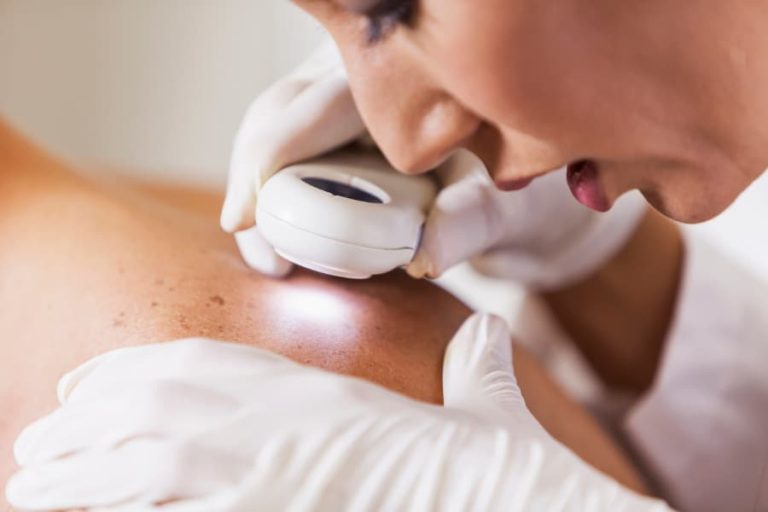
What Is Immunotherapy – and Is It Right for You?
If you or a loved one has been diagnosed with cancer, doctors can choose from many treatments to provide the best care possible for each
HIPAA Alert: Potential Data Breach Learn More
Questions on Oncology, Hematology and/or Infusion Clinical Services due to COVID-19 Crisis – CALL 833-698-1623
Important Information for Our Patients Regarding the Coronavirus.
RCCA Providing Area Cancer Patients with Access to Care During Coronavirus Outbreak
RCCA Offering Patients Virtual Visits During Coronavirus Pandemic
Skin cancer can take several forms, and it is important to know about the different skin cancer types and to be alert for signs or symptoms that warrant medical evaluation.
The highly-qualified oncologists of Regional Cancer Care Associates (RCCA) have extensive experience treating melanoma and advanced forms of other skin cancers. Offices are conveniently located throughout New Jersey, Connecticut, Massachusetts, and the Washington, D.C., area provide patients with ready access to world-class medical care for various forms of cancer and for benign hematologic conditions.
Skin cancer is the development of genetically mutated skin cells that reproduce and form a growth anywhere on the skin, the body’s largest organ. The six main forms of skin cancer are:
Squamous cell carcinoma is cancer of the thin, flat, scale-like cells found in the uppermost portion of the epidermis, the top layer of the skin. Squamous cell carcinoma accounts for about 20% of all skin cancer diagnoses and has a low risk of metastasizing, meaning spreading to other organs or tissues.
This kind of carcinoma occurs when basal cells, which are found just below the skin’s squamous cells, mutate and develop irregularly. Basal cell carcinoma is the most common cancer in the world and accounts for roughly 80% of all skin cancers. It often is found on the head and neck, and it very rarely spreads.
This is the third form of carcinoma. It is much more rare than the basal and squamous cell varieties, but it has a higher mortality rate due to its aggressively spreading nature. Merkel cells are found in the deepest part of the epidermis, next to hair follicle roots.
Melanoma is cancer of the melanocytes, the cells responsible for making melanin, the pigment that gives skin its color. It typically has a higher mortality rate than other skin cancers because of its fast-growing nature, but effective treatments are available. It mainly appears on the head and face as these areas of the body are most exposed to sun rays, but it can occur anywhere there is pigment – even including in internal organs.
Kaposi sarcoma is generally rare, although it can occur sometimes is seen in people infected with human immunodeficiency virus (HIV). As treatments for HIV and this skin cancer type have advanced, the five-year survival rate for Kaposi sarcoma has increased significantly.
Although this form of cancer arises in the lymph nodes, it can manifest on the skin.
By far, the most significant risk factor for skin cancer is exposure to ultraviolet rays from the sun or tanning beds. Even a handful of sunburns during youth can dramatically increase the chance that a type of skin cancer develops. Other risk factors for skin cancer include:

The signs of skin cancer vary, but there are a few warning signs that appear in many cases. These include:
Patients who notice these symptoms should see their primary care physician or dermatologist to have the skin lesion evaluated. In assessing a suspect mole or other skin lesion, physicians typically use the ABCDE system. These letters stand for:
Doctors stage skin cancers differently depending on the type. However, there is a general approach to staging all cancer. The disease typically is classified as:
There is a high survival rate, even for melanoma, if skin cancer is detected and treated early. Skin cancer treatments include:
Different types of surgery, including Mohs micrographic surgery,, can be highly effective for excising skin cancer.
This is a non-invasive form of treatment that often is used on benign and malignant tumors. It employs liquid nitrogen to freeze off cancerous cells. Cryotherapy typically heals evenly without forming scars.
Radiation therapy generally is reserved for use in later stages of skin cancer and often is delivered in combination with other therapies. It destroys cancer with high-energy wave devices.
Chemotherapy uses toxic drugs to kill cancer cells. Patients receive these treatments intravenously, by injection into specific areas of the body, or by swallowing pills or liquids taken by mouth.
Targeted therapy is similar to chemotherapy, and is a fairly new approach. As their name implies, targeted therapies act against specific mutations driving cancer growth, and so have an effect only on cells with these mutations rather than on nearby healthy cells.
Immunotherapies harness the power of the body’s own immune system to identify and attack cancerous cells. Immunotherapy has become a prominent component of the treatment plan for advanced melanoma in recent years.
A physician may recommend curettage and photodynamic therapy to eliminate cancerous cells in some patients, as well as clinical trials. It all depends on the specific type of skin cancer the patient has and how far it has advanced
Patients with melanoma and advanced forms of other skin cancers can trust the caring and reliable medical oncologists of Regional Cancer Care Associates, who treat all forms of cancer and blood disorders. To request an appointment, visit one of the many office locations across New Jersey, Connecticut, Massachusetts, and the Washington, D.C., area.
From empowering you with information and tools to fully understand skin cancer, to treating it quickly and comprehensively, RCCA is committed to your care. As one of the nation’s largest cancer physician networks, we have the reach, the resources and the localized accessibility to treat your very individualized needs with top-quality care and unfailing compassion.
For more information, or to schedule an appointment, call (844) 346-7222. You can also schedule an appointment by calling the RCCA location nearest you.

If you or a loved one has been diagnosed with cancer, doctors can choose from many treatments to provide the best care possible for each

Share on facebook Share on twitter Share on linkedin Share on email Share on print The New Jersey average of 22.2 new cases of melanoma

East Coast residents are no strangers to winter weather, and those long, chilly months tend to make time under the summer sun that much more appealing.
When standard cancer treatments aren’t providing the results you want, clinical trials may offer hope. Our physicians use clinical trials to study new treatments, helping transform cancer care for the better. You can enroll in a clinical trial to try groundbreaking treatment plans at zero cost to you.

Regional Cancer Care Associates is one of fewer than 200 medical practices in the country selected to participate in the Oncology Care Model (OCM); a recent Medicare initiative aimed at improving care coordination and access to and quality of care for Medicare beneficiaries undergoing chemotherapy treatment.